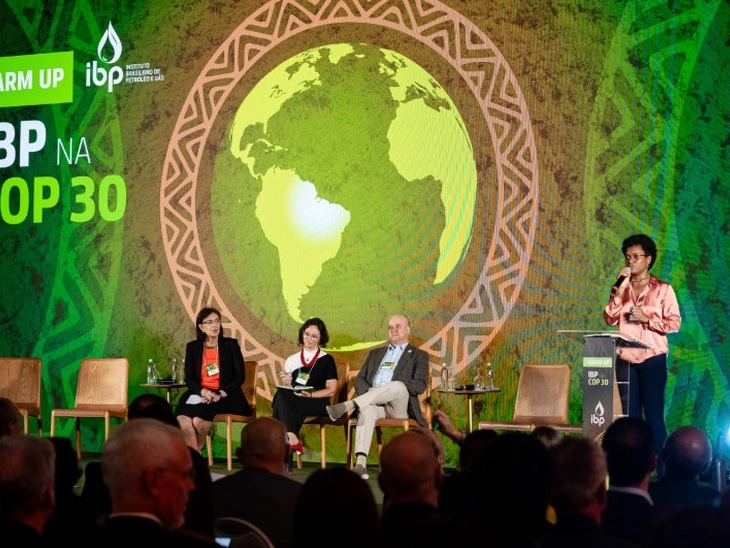Oil and Gas Sector Reinforces Its Commitment to Energy Transition at IBP's Pre-COP30 Event in Rio de Janeiro
The study "Transitioning Away from Fossil Fuels in Energy Systems" was launched in partnership with IBP and ICS, and produced by Catavento.
T&B Petroleum/Press Office IBP04/04/2025 05:25

The Brazilian Institute of Oil and Gas (IBP) held its first pre-COP30 event on April 2nd in Rio de Janeiro, bringing together sector leaders, government officials, and experts. On this occasion, the study "Transitioning Away from Fossil Fuels in Energy Systems" was launched. The document was produced by consultancy Catavento, in partnership with IBP and the Climate and Society Institute (iCS), aiming to contribute to a broader and more assertive debate on the actions and role of the oil & gas sector in the energy transition and decarbonization over the coming decades.
IBP President Roberto Ardenghy emphasized that COP30 represents a call to action on these topics. “We have the opportunity to follow the path of emissions reduction and strengthen our decarbonization position, as well as generate resources to finance GHG reduction programs and the future replacement of fossil fuels,” he said.
According to Ardenghy, oil and gas currently account for 80% of the world’s energy supply. “Energy transition is a marathon: we need preparation, we need to find pathways and strategies. The transition cannot create social imbalance — the richest 77 million people on the planet are responsible for around 16% of GHG emissions. We reject the idea that the oil and gas sector should not participate in public forums, because we have contributions to make in the transition and decarbonization processes,” he concluded.
Regarding the study, Ardenghy added: “Since COP28 in Dubai, when we started our dialogue on the 'Transitioning Away' study, our analysis has taken on a well-grounded academic profile, aimed at providing insights for the global energy transition debate.”
Victoria Santos, ICS’s Energy and Industry Manager, emphasized support for the role of biofuels and advanced fuels, and how we should expand this platform across the energy value chain to support global decarbonization.
Alice Amorim, Head of the COP30 Special Advisory Office, stated: “This is the first input of many more to come, so we can start putting into practice what was agreed at COP28 in Dubai.” She noted that the concept of the energy transition is still not fully understood. “What scale do we need to reach? There are many dimensions to this process, and we need to understand them in order to lead it effectively,” she added.
A Call for Energy Transition
Clarissa Lins, founding partner at Catavento, presented the study and warned that major producers and GHG emitters—such as the United States and Russia—risk jeopardizing the management of $350 billion in assets.
According to her, these economies could be severely impacted in a future carbon-constrained environment, which may alter global public policy development and affect access to domestic savings and global funds. This, in turn, could raise credit costs due to ratings issued by international agencies.
“We assessed producers and consumers across 11 countries in 7 different regions, to provide a balanced and robust snapshot of the global oil & gas market in relation to the energy transition,” Clarissa explained. She emphasized the need to understand both supply and demand, and to consider five key dimensions for analyzing the transition process: the relevance of oil and gas production (its contribution to exports, national wealth, and GDP), competitiveness, energy security, emissions profile, and social resilience (how long-term changes should be structured and promoted).
Decarbonization: A Commitment from the Private Sector
Petrobras Executive Director of Exploration & Production, Sylvia Anjos, pointed out Brazil’s unique position in the global energy landscape:
“In Brazil, the energy sector (including transportation and others) accounts for 20% of emissions. When we focus specifically on oil and gas exploration and production, our industry accounts for only 2% of total emissions,” she stated.
Flavio Rodrigues, Vice President of Corporate Relations and Sustainability at Shell, mentioned that the company conducted an eight-month study in 2024 and concluded that greater synergy with the Paris Agreement goals is needed. “Brazil could be a leader in the energy transition and the first to reach net-zero by 2050. We’ve also discussed the impact of artificial intelligence in the coming years, especially given its rising demand for energy,” he noted.
Andres Guevara, bp President in Brazil, said the company is focused on low-carbon solutions — including ethanol and SAF — aligned with the decarbonization of its oil operations. “Brazil is privileged with highly competitive pre-salt oil, renewable resources, and a clear policy to foster green technologies through the 'Fuel of the Future' program,” he said.
Olivier Bahabanian, President of TotalEnergies, emphasized the need to decarbonize the oil and gas sector at greater scale and speed.
Viviana Coelho, Petrobras Energy Transition Director, stated that oil remains an input present in net-zero scenarios for the coming decades.
“We must ask how we fit into the global energy value chain and how to analyze energy evolution. Data is essential to evaluate this entire landscape,” she added.
Paulo Van der Ven, Director of Operations and Logistics at Equinor Brazil, pointed out that the energy transition journey should be deepened and aligned with new green technologies and innovation pathways for decarbonization.
Fernanda Scoponi, Renewable Business Development Manager at TotalEnergies, noted that the company’s portfolio is shifting increasingly toward sustainable energy, and reinforced that Brazil offers strong legal frameworks for oil production, ensuring long-term investment security.
Willian Nozak, Petrobras Executive Manager of Integrated Energy Transition Management, stated that energy transition is a firm commitment at Petrobras. He highlighted the growing market scale of Diesel R, a renewable fuel, and emphasized the need to model carbon capture and storage (CCUS) systems for both onshore and offshore dedicated projects.
Transitioning away from fossil fuels in energy systems




